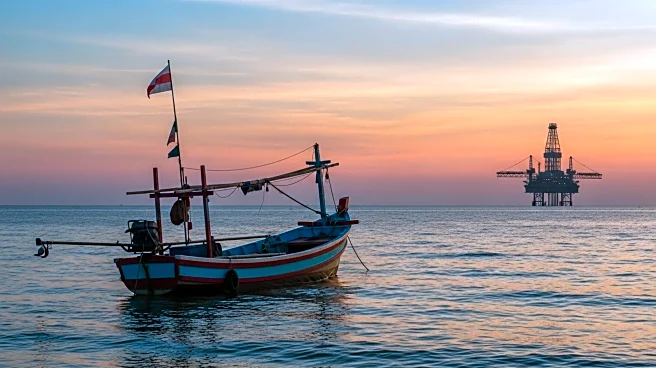What is the story about?
What's Happening?
In Senegal's northern city of Saint-Louis, local fishermen are expressing frustration over the impact of the Greater Tortue Ahmeyim (GTA) gas project, operated by BP in partnership with Kosmos Energy and national oil companies of Senegal and Mauritania. The project, which began operations in 2017, is located on the maritime border between Senegal and Mauritania. Fishermen claim that the gas platform, which includes a 500-meter exclusion zone, restricts their access to rich fishing grounds, leading to reduced catches and economic hardship. The project is part of a broader effort to position Senegal as a key player in the global energy market, but it has sparked local discontent due to its perceived negative impact on traditional fishing practices.
Why It's Important?
The situation in Saint-Louis highlights the tension between economic development through fossil fuel projects and the preservation of traditional livelihoods. The gas project is seen as a significant economic opportunity for Senegal, potentially boosting foreign exchange and strengthening its energy sector. However, the exclusion zones and environmental concerns raised by local fishermen and environmental groups like Greenpeace Africa underscore the challenges of balancing industrial growth with community needs. The reduction in fish stocks affects not only the fishermen but also the broader community, including women involved in fish processing, thereby impacting local employment and economic stability.
What's Next?
BP has committed to creating artificial reefs to mitigate the impact on fishing, with plans to complete a substantial reef complex by the end of 2025. However, local fishermen remain skeptical about the effectiveness and location of these reefs. The Senegalese government and BP are under pressure to address these concerns and ensure that the benefits of the gas project are equitably distributed. Ongoing dialogue between the government, BP, and local communities will be crucial in finding a sustainable solution that supports both economic development and traditional livelihoods.
Beyond the Headlines
The conflict in Saint-Louis reflects broader global challenges in managing natural resources and the environment. The gas leak incident earlier in 2025, described by BP as 'gas bubbles,' has raised environmental safety concerns, emphasizing the need for stringent regulatory oversight. The situation also highlights the ethical considerations of prioritizing industrial projects over local communities' rights and traditions. As Senegal navigates its role in the global energy market, the outcomes of this situation could set precedents for how similar conflicts are managed in other regions.















